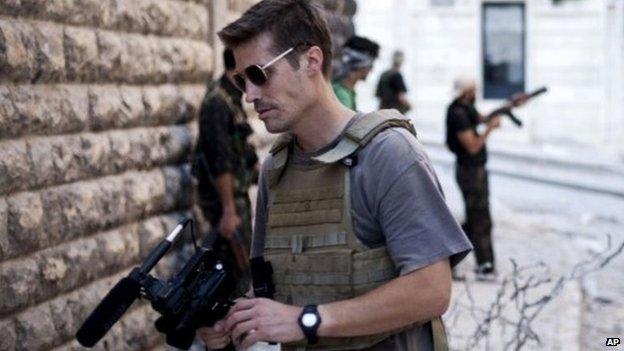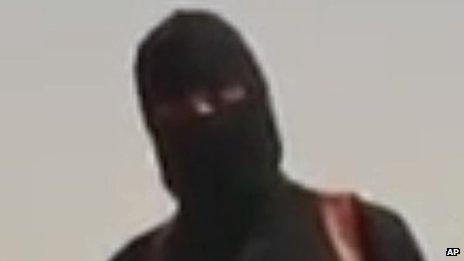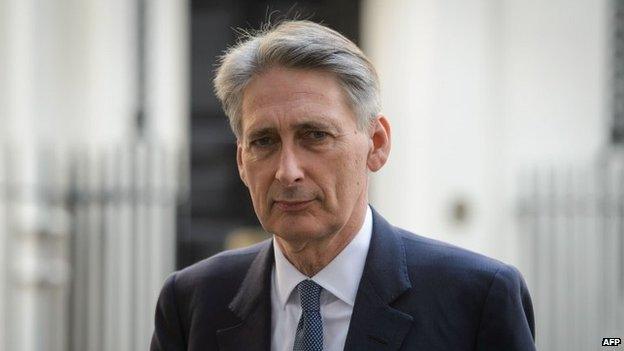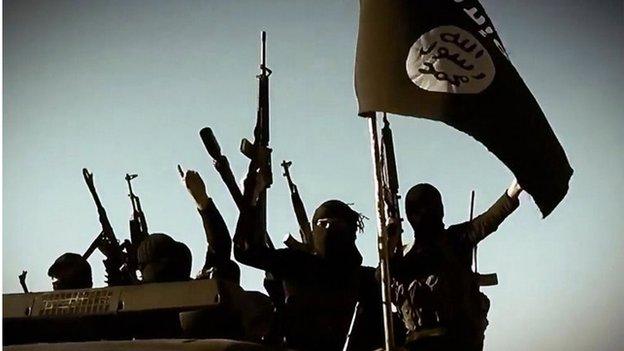James Foley beheading: UK close to identifying jihadist
- Published

James Foley was reporting in Syria when he was captured in 2012
The UK is close to identifying a suspected British jihadist from the footage of the killing of a journalist, the ambassador to the US has said.
The Islamic State (IS) militant with an English accent appears in the extremist group's video of the killing of American journalist James Foley.
"I do know from my colleagues at home that we are close," Peter Westmacott told CNN's State of the Union show., external
The Foreign Office and Home Office refused to comment on the remarks.
"We do not comment on security matters," an FCO spokesman said.
'Sophisticated technologies'
Mr Westmacott said: "We're not far away from that [finding Foley's killer]. We're putting a lot into it."
He added that some "very sophisticated" voice recognition technology was being used in the hunt, which is being led by the FBI.
"I can't say more than this at the moment, but I do know from my colleagues at home that we are close," he added.
Earlier this month, extremist group IS published a video of the moments before and after the apparent beheading of Mr Foley, 40, who was seized in Syria in 2012.

The man shown in the video spoke with an English accent
Referring to the 500-plus British citizens who are thought to have travelled to Syria and Iraq to fight in the past few years, Mr Westmacott said: "It goes beyond one horrendous criminal... It's a betrayal of all our values."
His comments come after Foreign Secretary Philip Hammond wrote in the Sunday Times, external that the government was investing "significant resources" to tackle "a barbaric ideology".
Mr Hammond also warned the threat from conflicts in Syria and Iraq could last a generation.

Philip Hammond said the conflicts in Iraq and Syria could last a generation
Downing Street earlier announced the appointment of a new security envoy to Iraq.
Lt Gen Sir Simon Mayall, the government's senior defence advisor for the Middle East, will travel to the country next week to meet political leaders.
Work is also under way to supply "non-lethal equipment" to Kurdish forces who are battling IS, including night vision equipment and body armour, a No 10 spokesman added.
Domestic threat
Home Secretary Theresa May has said the government is looking at new powers to tackle the threat of extremism in Britain.
But shadow home secretary Yvette Cooper called for a stronger domestic response.
"More must be done to stop British citizens joining the barbarism and to keep the country safe if they return," she wrote in the Sunday Times.

Islamic State was formed out of al-Qaeda in Iraq in 2013
She called for more action "to disrupt the travel plans of those planning go out to fight through better monitoring of the borders' watch list as well as access to passports".
The Home Office insisted it would take the "strongest possible action" against people travelling to fight in Iraq and Syria.
A spokesman said: "The police, security services and Border Force are actively working to identify, detect and disrupt terrorist threats, including from British fighters attempting to return to the UK.
"They use a wide range of powers including those which allow them to detain and interview individuals at the UK border suspected of being involved in terrorism."
Senior Conservative MP David Davis, meanwhile, said TPims - used to restrict movement, the use of computers and mobile phones and meetings with others - were "completely useless".
"What happens with them is that all the dangerous villains get away - they leave the country, go off back to Pakistan or now to Iraq," he told BBC Radio 4's The World This Weekend.

Formed out of al-Qaeda in Iraq (AQI) in 2013, IS first captured Raqqa in eastern Syria
By early 2014, it controlled Falluja in western Iraq
Has since captured broad swathes of Iraq, seizing the northern city of Mosul in June
Fighting has displaced at least 1.2 million Iraqis
Pursuing an extreme form of Sunni Islam, IS has persecuted non-Muslims such as Yazidis and Christians, as well as Shia Muslims, whom it regards as heretics
In July alone, IS expanded dramatically, recruiting some 6,300 new fighters largely in Raqqa, an activist monitoring group said

Government forces in Iraq said on Sunday that they had defeated an attack - suspected to be by IS - on the country's largest oil refinery, killing several insurgents.
The Baiji refinery in northern Iraq has been the site of several battles between government forces and militants over the past few months.
Meanwhile, a car bomb killed at least seven people in the capital Baghdad.